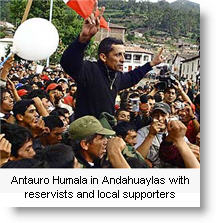 A Peruvian court on Tuesday lowered the sentence of Antauro Humala, the brother of President-elect Ollanta Humala, from 25 years in prison to 19 or 17 years, daily La Republica reported.
A Peruvian court on Tuesday lowered the sentence of Antauro Humala, the brother of President-elect Ollanta Humala, from 25 years in prison to 19 or 17 years, daily La Republica reported.
Antauro Humala is serving a sentence for the 2005 assault on a police station in the Andean town of Andahuaylas that resulted in the deaths of four police officers.
Antauro led a group of some 130 ultra-nationalist “Etnocaceristas” in a New Year’s Day siege of a police station in Andahuaylas, located in Apurimac region in southern Peru. The group took hostages, demanding that then-President Alejandro Toledo resign for selling out Peru to foreign corporate interests – Chilean investors in particular.
The policemen were killed in a roadside ambush during the ensuing three-day standoff. Police snipers killed two of Humala’s men the following day.
The Peruvian court said that Antauro was guilty of rebellion and manslaughter, but it absolved him of first degree murder and the illegal possession of arms.
Three of the court’s five judges said that Antauro should receive a sentence of 19 years, while two other judges said it should be 17 years.
Criminal lawyer Mario Amoretti told Radioprogramas that the court needs an agreement by at least four judges before it can announce the sentence. As a result, another judge will intervene to settle the issue.
Antauro’s brother, Ollanta, who will take office on Thursday as President of Peru, was military attaché in South Korea at the time of the incident. He has denied any direct involvement even though Antauro loudly proclaimed throughout the siege that he was acting at the behest of his brother, with whom he allegedly maintained cell phone contact.
During the takeover, Ollanta called Radioprogramas from Seoul and issued a “command” to Peru’s army reserve to rise up against former President Alejandro Toledo. He quickly backed down from that position and called for an end to the siege after learning about the bloodshed. He later distanced himself from Antauro and the radical movement he led in Ollanta’s name. He has steadfastly denied any direct involvement ever since.
The Etnocacerista movement was based on a military, ethnic and nationalist view of Peru, choosing as its hero Marshal Andres Avelino Caceres, an army officer who spoke Quechua. For three years, Caceres led the indigenous resistance in the central Andean highlands against the Chilean invasion in the War of the Pacific (1879-1883) and later became President of Peru for two separate terms.





